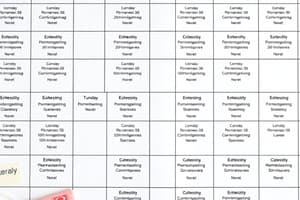Podcast
Questions and Answers
What is the primary focus of a polytechnic?
What is the primary focus of a polytechnic?
- Research and theoretical studies
- Political science and humanities
- Liberal arts education
- Vocational and technical education (correct)
Which type of program is NOT typically offered at a polytechnic?
Which type of program is NOT typically offered at a polytechnic?
- Information technology
- Fine arts (correct)
- Mechanical engineering
- Environmental science
What is one of the key benefits of attending a polytechnic?
What is one of the key benefits of attending a polytechnic?
- Shorter duration for programs compared to traditional universities (correct)
- Fewer industry connections for job placements
- Emphasis on theoretical knowledge without practical application
- Focus solely on academic research
What common admission requirement is needed for polytechnic programs?
What common admission requirement is needed for polytechnic programs?
Which statement best describes the global presence of polytechnics?
Which statement best describes the global presence of polytechnics?
Flashcards are hidden until you start studying
Study Notes
Definition
- A polytechnic is an educational institution that focuses on vocational and technical education.
- Offers diploma and degree programs primarily in engineering, technology, and applied sciences.
Key Features
- Emphasizes practical and hands-on training alongside theoretical knowledge.
- Often collaborates with industries to ensure curriculum relevance and job readiness.
- Provides a range of programs that may include certificate, diploma, and degree courses.
Types of Programs
- Engineering Programs
- Mechanical, Civil, Electrical, Electronics, etc.
- Technology Programs
- Information Technology, Computer Science, Network Engineering, etc.
- Applied Sciences
- Environmental Science, Biotechnology, Health Sciences, etc.
- Business and Management
- Business Administration, Hospitality Management, etc.
Benefits of Attending a Polytechnic
- Strong focus on employability and skill development.
- Industry connections often lead to internships and job placements.
- Typically shorter duration for programs compared to traditional universities.
Global Presence
- Polytechnics are found worldwide, often with variations in naming (e.g., technical colleges, institutes of technology).
- Countries like Germany, Canada, Australia, and India have notable polytechnic systems.
Admission Requirements
- Usually require completion of secondary education.
- May include entrance examinations or assessments specific to the field of study.
Career Opportunities
- Graduates can pursue careers in specific technical fields, often enjoying high demand in the job market.
- Opportunities in sectors such as engineering, information technology, healthcare, and manufacturing.
Further Education
- Many polytechnic students continue their education at universities, often with advanced standing due to their practical experience and coursework.
Definition
- Polytechnic institutions specialize in vocational and technical education, preparing students for specific careers.
- They typically offer diverse diploma and degree programs in fields like engineering, technology, and applied sciences.
Key Features
- Curriculum combines practical training with theoretical instruction to enhance learning.
- Close collaboration with industries ensures that educational programs remain relevant to current job market needs.
- Offers a variety of programs, including certificates, diplomas, and degrees for various fields of study.
Types of Programs
- Engineering Programs: Includes disciplines such as Mechanical, Civil, Electrical, and Electronics engineering.
- Technology Programs: Focuses on Information Technology, Computer Science, and Network Engineering.
- Applied Sciences: Covers areas like Environmental Science, Biotechnology, and Health Sciences.
- Business and Management: Emphasizes fields such as Business Administration and Hospitality Management.
Benefits of Attending a Polytechnic
- Curriculum prioritizes employability and skill development, making graduates more competitive in the job market.
- Strong industry ties often facilitate internship opportunities and job placements for students.
- Programs generally have a shorter duration compared to traditional university degrees, enabling quicker entry into the workforce.
Global Presence
- Polytechnic institutions exist globally, often referred to differently, such as technical colleges or institutes of technology.
- Notable polytechnic systems can be found in countries like Germany, Canada, Australia, and India, each with unique program structures.
Admission Requirements
- Requires the completion of secondary education as a prerequisite for admission into programs.
- Some programs may mandate entrance exams or specific assessments tailored to the area of study.
Career Opportunities
- Graduates are well-prepared for technical careers, with many fields experiencing high demand for skilled workers.
- Career paths available in sectors such as engineering, information technology, healthcare, and manufacturing.
Further Education
- Many students choose to pursue further education at universities after completing polytechnic programs, often achieving advanced standing due to their practical training and coursework.
Studying That Suits You
Use AI to generate personalized quizzes and flashcards to suit your learning preferences.




